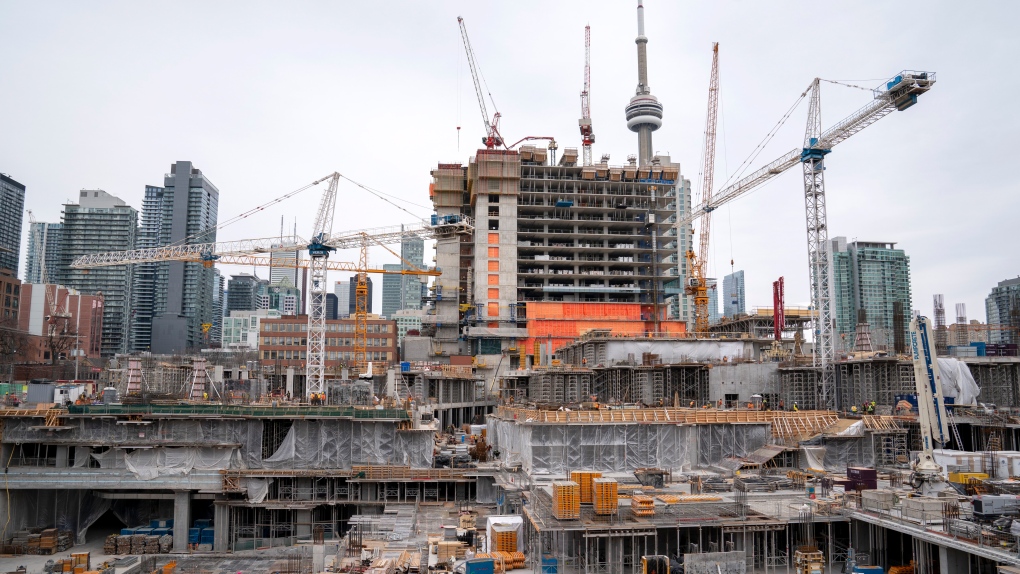Toronto has a plan to incentivize the construction of 20,000 new rental homes
 A construction site in full swing in Toronto on Wednesday March 18, 2020. THE CANADIAN PRESS/Frank Gunn
A construction site in full swing in Toronto on Wednesday March 18, 2020. THE CANADIAN PRESS/Frank Gunn
Toronto city staff have an ambitious new plan to build 20,000 rental homes but the initiative hinges on significant financial support from other levels of government.
Mayor Olivia Chow’s executive committee is set to consider the plan at a meeting this week, though it would still need to go to city council as a whole at a later date.
If approved, the plan would create a new incentive program to help spur on the construction of purpose-built rentals.
Staff say that as part of a tiered “quick start” approach the city would immediately release a “rapid call for applications” to build approximately 7,000 new rental homes, including 1,400 affordable units.
The city would then agree to defer development charges for the rental homes indefinitely at a cost of approximately $210 million. The city would also waive property taxes for the affordable units for a period of 40 years at an additional cost of approximately $136 million.
The second phase of the plan aims to build an additional 13,000 rental homes, including 2,600 affordable units.
However, at this point it remains unfunded.
Staff are proposing that the city could incentivize the construction of the additional units if the province agrees to provide $1 billion in financial support.
That money would then be used to fully exempt eligible units from property taxes for 40 years and waive development charges indefinitely.
“Toronto’s current rental housing crisis is decades in the making. All orders of government have a role in responding to this crisis and ensuring the housing system has sufficient new homes, especially rental homes, to meet the needs of Toronto residents now and for generations to come,” the staff report notes.
The City of Toronto already waves 15 per cent of property taxes for all new purpose-built rentals. But the provincial money would help reimburse the city for lost revenue related to the full property tax exemption, something that carries an estimated cost of more than $115,000 per unit.
As part of the wider plan, the city would also ask the federal government to “immediately allocate” a $7.3 billion portfolio of low-cost financing support to help support the construction of the new units.
In the report, staff argue that the city’s capacity to help support the construction of 20,000 new rental homes solely on its own has been limited by various fiscal constraints, including the Ford government’s decision to slash some development charges.
Staff also warn that, without intervention, the city’s lack of purpose-built rentals is “likely to worsen due to high interest rates and financing costs, inflation, and increasing construction costs.”
“An adequate supply of purpose-built rental homes is central to a well-functioning housing system that can meet the housing needs of current and future residents. However, Toronto is facing a shortage of purpose-built rental homes as a direct result of insufficient investments from all orders of government since the early 1990s,” the report notes.
According to staff, approximately 85 per cent of all new rental homes created in Toronto over the last decade have come from the secondary market, mainly in the form of condominium owners renting out units.
Chow’s executive committee will consider the report at a meeting scheduled for Tuesday.
CTVNews.ca Top Stories

'My two daughters were sleeping': London Ont. family in shock after their home riddled with gunfire
A London father and son they’re shocked and confused after their home was riddled with bullets while young children were sleeping inside.
How much do you need to earn to buy a home? Income requirements continue to ease
The average salary needed to buy a home keeps inching down in cities across Canada, according to the latest data.
Genetic evidence backs up COVID-19 origin theory that pandemic started in seafood market
A group of researchers say they have more evidence to suggest the COVID-19 pandemic started in a Chinese seafood market where it spread from infected animals to humans. The evidence is laid out in a recent study published in Cell, a scientific journal, nearly five years after the first known COVID-19 outbreak.
Smuggler arrested with 300 tarantulas strapped to his body
Police in Peru have arrested a man caught trying to leave the country with 320 tarantulas, 110 centipedes and nine bullet ants strapped to his body.
Boissonnault out of cabinet to 'focus on clearing the allegations,' Trudeau announces
Prime Minister Justin Trudeau has announced embattled minister Randy Boissonnault is out of cabinet.
Baby dies after being reported missing in midtown Toronto: police
A four-month-old baby is dead after what Toronto police are calling a “suspicious incident” at a Toronto Community Housing building in the city’s midtown area on Wednesday afternoon.
Sask. woman who refused to provide breath sample did not break the law, court finds
A Saskatchewan woman who refused to provide a breath sample after being stopped by police in Regina did not break the law – as the officer's request was deemed not lawful given the circumstances.
Parole board reverses decision and will allow families of Paul Bernardo's victims to attend upcoming parole hearing in person
The families of the victims of Paul Bernardo will be allowed to attend the serial killer’s upcoming parole hearing in person, the Parole Board of Canada (PBC) says.
'They squandered 10 years of opportunity': Canada Post strike exposes longtime problems, expert says
Canada Post is at ‘death's door’ and won't survive if it doesn't dramatically transform its business, a professor who has studied the Crown corporation is warning as the postal workers' national strike drags on.

































